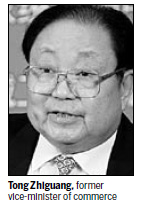Investment
Foreign firms should adjust to changing Chinese market
By DING QINGFEN (China Daily)
Updated: 2010-08-18 18:39
 |
Large Medium Small |
BEIJING - Chinese policies tailored to foreign investors have essentially remained "unchanged" during the past three decades, and it's unwise for foreign businesses to always "politicize" trade issues, Tong Zhiguang, former vice-minister of commerce, told China Daily in an exclusive interview.
Instead, they should try to "adjust themselves" to the changing economic development mode China is in -one of fierce competition in the domestic marketplace, rather than "continuously complaining", Tong suggested.

Responding to ongoing concerns that China is turning hostile against foreign businesses during the past few months, Tong insisted that he has "not seen any changes with China's policies of absorbing foreign investment", and the policies have been "in line with the World Trade Organization rules".
"China has welcomed foreign investment and I believe the nation will continue to do so by all means, as the nation understands foreign businesses play a key role in pushing forward Chinese development," said Tong, also former chief WTO negotiator.
Tong's viewpoint echoed Commerce Minister Chen commentary published in the Financial Times several weeks ago. Chen Deming said China is wide open to the world and "will open wider in the future and the rest of the world will benefit".
Procurement tenders
In late 2008, China launched a 4-trillion-yuan ($586 billion) stimulus package that generated a large volume of procurement projects.
In 2009, 55 percent of the 12,439 tenders for procurement of electromechanical products went to foreign enterprises. "China has followed strict tender rules to ensure a level playing field for both Chinese and foreign companies," Chen said.
Foreign enterprises' complaints are mainly focused on issues of intellectual property rights and market access including government procurement and indigenous innovation.
"I don't think their complaints make sense, and what makes them really uncomfortable and unhappy is the growing competitiveness of Chinese enterprises. They feel the strong research and development capability of their local peers will put them in a disadvantageous position," Tong said.
Chen pointed out in his commentary that "all foreign enterprises are given equal treatment and all their products are considered to be 'made in China'".
He added that foreign businesses cannot lower their guard because the "super national treatment", tailored for foreign businesses years ago, has disappeared.
At the beginning of reform and opening up, China launched many preferential policies for foreign investment and they enjoyed more favorable policies than their local counterparts, including lower corporate income tax.
But thanks to China's entry into the WTO and the nation' transformation towards stronger economic development, foreign businesses now have an even playing field with their local counterparts.
"The gap makes them feel they are not the darling of the moment any longer and the requirements are stricter, which naturally generates the deteriorating environment argument, but this is far from the truth," said Wang Zhile, director of the research center under the Ministry of Commerce.
"They should consider getting rid of the inertial mindset."
In June, China submitted a revised proposal on joining the government procurement agreement (GPA) to the WTO, on which, the government procurement agreement member nations, including the United States, are still unsatisfied and threatened not to accept the proposal although they agreed that the new plan contained significant improvements compared with in 2007.
US Senator Debbie Stabenow from Michigan has also claimed she would introduce legislation to prevent US enterprises from buying Chinese goods until China signed the government procurement agreement.
"They are making a fuss about nothing. China has made big progress on lowering the threshold and widening the sectors, and it's rude of them to ask more and threaten China," Tong told China Daily.
Ian Bremmer, president of the Eurasia Group, a global political risk research and consulting firm, said he believed China's government procurement agreement issue and trade policies are "getting politicized" by the US.
Ignatius Lim, commercial counselor with the Embassy of Singapore in China, also agreed. "It's unnecessary for (European and US enterprises) to politicize common trade and economic issues. The Chinese investment environment is fairly attractive," he said.
"Trade conflicts are unavoidable, but business consultations are what we believe is the best way out."
Singapore is the fourth largest foreign investing nation in China, and accumulated investments were $40 billion by 2009. "Considering Chinese economic growth, Singaporean enterprises will make more investments here," said Lim.
Case-by-case basis
"The complaints from Siemens and BASF are individual cases and are not universal," said Tong.
China's foreign direct investment in June surged 40 percent year-on-year to $13 billion, recording the highest by volume since December 2007, while that figure was 29 percent in July.
The German Chamber of Commerce in China said "complaints do not mean German enterprises will stop doing business or expanding investments here, but the point is there could be more foreign investment flowing into China if some of our concerns are solved nicely."
Germany, a leading investor nation in China, is witnessing more of its enterprises beefing up their presence in China.
According to a recent survey by the German Chamber of Commerce, 60 percent of the interviewees said they will add to investments in China, and that China is also the most attractive foreign direct investment destination for German companies.
CHINA DAILY